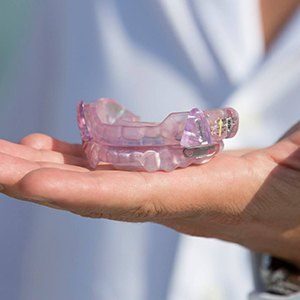 If your little one has a habit of grinding or clenching their teeth, a nightguard can help. Not only can it protect their teeth from damage, but it can also improve jaw pain, headaches, and other symptoms of bruxism. You could drive down to the local drugstore to purchase one, but your child’s smile deserves the best protection. While they may look similar, here’s what you need to know about the differences between an OTC and a professional nightguard.
If your little one has a habit of grinding or clenching their teeth, a nightguard can help. Not only can it protect their teeth from damage, but it can also improve jaw pain, headaches, and other symptoms of bruxism. You could drive down to the local drugstore to purchase one, but your child’s smile deserves the best protection. While they may look similar, here’s what you need to know about the differences between an OTC and a professional nightguard.
Does Your Child Need a Nightguard?
Although it’s often thought to only affect adults, 20% of children will develop bruxism before the age of 11. While many will outgrow it, teeth grinding can do a number on your child’s smile in the meantime. The pressure and friction can cause enamel erosion, breaks, and fractures. Your little one may develop sensitive or loose teeth. Bruxism is also connected to many uncomfortable symptoms, like facial pain, neck pain, and headaches.
A nightguard is designed to create a cushion between the upper and lower teeth to absorb the pressure of grinding and clenching. It will also protect your child’s teeth and any bothersome symptoms.
OTC Nightguard VS Professional Nightguard
Purchasing an OTC mouthguard appears as a convenient and affordable option to safeguard your little one’s teeth, but it can cause more harm than good. You can choose from a one-size-fits-all nightguard; however, it won’t fit your child’s mouth well. A poorly fiitting nightguard can be ineffective and uncomfortable.
As an alternative, there are boil and bite OTC products, which can offer a better fit. However, it still won’t fit your child’s teeth as snuggly as it should for maximum protection. Not to mention, they are often made from low-quality materials.
You can ensure no area of your child’s smile is unprotected by taking them to a dentist for a nightguard. Their dentist will examine their mouth to find the cause of the grinding and look for any dental damage. Your child’s mouthguard will be made of high-quality materials using advanced technologies for the utmost precision. It will fit their mouth like a glove while giving the best protection available against bruxism.
Is a Professional Nightguard Worth the Cost?
It’s true you’ll pay more for a professional nightguard, but it can save you thousands of dollars by avoiding costly dental bills later. You can’t put a price on the benefits your little one will enjoy, so they can drift off to sleep comfortably.
Don’t leave your child’s smile vulnerable to bruxism for one more night. Contact their pediatric dentist to request an appointment for a high-quality nightguard. You and your child can rest easy knowing their teeth are protected.
About Dr. Janet Ramial
Dr. Ramial achieved her dental degree from Baylor College of Dentistry and completed advanced education in general dentistry and pediatric services. She has over 20 years of experience catering to young smiles. If your child suffers from bruxism, contact our office today to schedule an appointment for a nightguard.
